Next Monday, 15 January, the Galway Anti-Racism Network will hold a public meeting exploring the difficulties faced by people living under Direct Provision.
The meeting features speakers who have lived experiences of the system.
GARN says that the exhibition of work will be so powerful that the everyday misery of life in Direct Provision will be ‘implanted on your mind.’
Organisations and political parties like GARN are determined to make 2018 the year that Direct Provision is dismantled, but they say that they need more allies.
Public Meeting and Exhibition: What is Direct Provision?
Monday 15th January in the Harbour Hotel 7-10pm.
Please RT and share. All are welcome to attend. pic.twitter.com/vfuKAU3SRN
— GARN (@galwayantiRN) January 8, 2018
Direct Provision was brought in as an emergency measure in 1999, but almost two decades on, GARN says that it is shocked at how little the average Irish person knows about it. So here’s a quick guide to Direct Provision.
(An in-depth diary by one of the speakers at Monday’s public meeting, Vukašin Nedeljkovic, is available here.)
What is Direct Provision?
Under international law, the Irish government is required to provide the basic needs of food and shelter for asylum seekers directly while their claims for refugee status are being processed. This can take over five years.
The government chooses to do this rather rather than provide full cash payments.
Direct provision has been in place for almost 18 years. When it began in 2000, asylum seekers received full board accommodation and personal allowances of €19.10 per adult and €9.60 per child per week, but conditions the quality of life in the system have been heavily criticised by human rights organisations.
What are Asylum Seekers given under Direct Provision?
The bare minimum for survival. Asylum Seekers are given accommodation, food and a personal allowance of €21.60 per week.
The cost of all meals, heat, light, laundry, TV, household maintenance, etc. are paid for.
What are the concerns?
Those living under Direct Provision are often unable to access education, employment or even to cook for themselves.
The adult weekly allowance has not changed in real terms since its introduction 18 years ago.
Once in the system, Asylum Seekers don’t know how long they will remain there.
As a result of being separated from the rest of society, anxiety, depression and ill health are widespread.
We have a homelessness crisis. Shouldn’t we look after our own first?
Ireland has never looked after its own.
Emigration, the Troubles, the Mother and Baby Homes, Magdalene Laundries, psychiatric institutions, the Catholic Church’s cover-up of abuse across the country.
Between the 1920s and the 1960s, 1% of the Irish population at any given time were locked up in inhumane institutions, often run by the Church, away from the rest of society.
Who is speaking at next Monday’s meeting?
- Lucky Khambule of MASI (Movement of Asylum Seekers in Ireland)
- Vukasin Nedeljkovic of Asylum Archive
- Blessing Moyo of One World Tapestry
- Peju Awoyemi of Galway Anti Racism Network (Chair)












